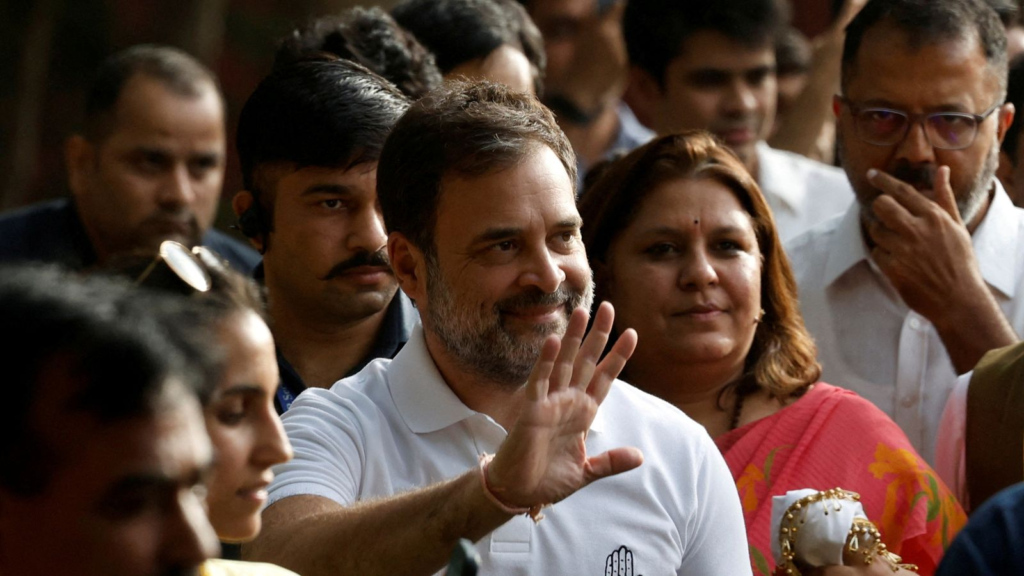India’s popular but controversial leader, who first swept to power in 2014, is hoping to secure a third consecutive term as prime minister. Exit polls had suggested his party would win an overwhelming majority – and he has declared victory Modi – but that now appears unlikely.

Early counting in India’s election suggests the party of Narendra Modi may get fewer votes than expected.
A total of 272 seats are needed for a majority in the country’s lower house of parliament – but his Bharatiya Janata Party (BJP) is ahead only in 242 seats so far.
However, if the Bharatiya Janata Party fails to secure an absolute majority, it is expected to form a coalition government, potentially ensuring Modi’s third consecutive term as prime minister.
Post-election opinion polls had predicted that the popular but controversial Modi would win a landslide majority.
His party won landslide victories in the previous elections in 2014 and 2019.
The BJP is part of the National Democratic Alliance (NDA), a broader coalition of parties that dominates in a total of 283 constituencies.
If Modi does indeed lead a coalition government, the 73-year-old would be only the second prime minister to win three consecutive terms after Indian independence leader Jawaharlal Nehru.
Counting of 642 million votes in the world’s largest election began this morning, with about half counted so far.
Despite Tuesday’s initial results, PM Modi declared victory in a statement on X (formerly Twitter).
He wrote: “People have placed their faith in the NDA for the third time in a row. This is a historic achievement in the history of India.”
PM Modi also thanked BJP supporters and workers, adding that “their extraordinary efforts can never be expressed in words.” Negotiations’
The Hindu nationalist Bharatiya Janata Party and its allies faced a broad opposition alliance led by the Congress Party and its main campaign leader, Rahul Gandhi.

According to the initial count, the anti-Modi coalition is leading in 232 constituencies so far.

Indian political commentator Arati R. Jerath said:
“Mr Modi is not exactly known as a consensus-oriented person. So it will be very interesting to see how he handles the pull and pressure of a coalition government.” To win an absolute majority, this will be “uncharted territory for Indians and for the Prime Minister.”
The party “will depend heavily on the goodwill of its allies and could be a key player that can be expected to play a role in both policy-making and government formation,” he added. After voting began in mid-April, 10% of the world’s population was eligible to vote. According to official data, the average turnout for all seven phases was about 66%.
Modi transformed the Indian political landscape during his 10-year tenure and his popularity outweighed that of his party.
But his decade of leadership has left the country deeply divided on religious and economic grounds.
“hybrid government”
Modi’s opponents and critics say his Hindu-first policies have led to intolerance, hate speech and brazen attacks on minorities in the country, raising concerns about the treatment of Muslims, Christians and other religious groups.
India’s economy is among the fastest-growing in the world and has helped the country emerge as a global power and a counterweight to China.
But it has become unequal, with only a small portion of Indians benefitting from the economic boom and youth unemployment soaring.
The country’s democratic values under Mr Modi’s leadership have also come under scrutiny.
Under Mr Modi, the media – once viewed as vibrant and largely independent – has become more pliant and critical voices muzzled.
Many watchdogs have now categorised India as a “hybrid regime” that is neither a full democracy nor a full autocracy.
Mr Modi’s government has repeatedly denied and dismissed accusations of discrimination, saying its policies aim for the welfare of all communities without bias and that it enforces the law equally.

